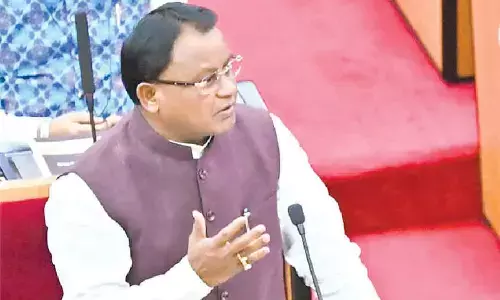Amid hope and despair, healthtech startups seem here to stay

Amid hope and despair, healthtech startups seem here to stay
Many patients still prefer in-clinic consultations
When the Covid-19 pandemic struck, it brought our existing mechanisms of healthcare to a roadblock that was lethal. The contagion made all our accomplishments seem inadequate to handle the trouble brewed by the virus. Yet, arguably, the most reliable weapon in humanity's arsenal proved to be the technology, which revolutionised traditional structures to keep human life afloat across domains. Again it was technology, or more specifically healthtech, which dawned a new era in public healthcare.
Today, healthtech startups witness a tremendous rise, and as the phenomenon unfolds, it is worthwhile looking at the promises and the challenges attached to it.
With a rise in online consultations, a reliance on telemedicine, health-tracking and several remote mechanisms, healthtech has rejuvenated itself, so to say. There has been a paradigm shift with several changes at the policy level.
As one section of the media reports, according to 'India's Healthcare Sector Transformation in the Post Covid Era' report by KPMG, in order to legalise telemedicine, the Union Ministry of Health and Family Welfare, with NITI Aayog, came up with new guidelines which allow registered medical practitioners (RMPs) to provide healthcare services using telemedicine. We are seeing not just changes in trends and practices but also in the perspectives of authorities who have come to grips with the need of the hour. It is thus safe to say that changes abound alongside the beneficial outcomes in this sector. As Business Today reports, according to Invest India, the national investment promotion and facilitation agency under the Department for Promotion of Industry and Internal Trade (DPIIT), the Noida-based healthtech start-up Innovaccer, which analyses healthcare data to provide actionable insights to hospitals, insurance companies, and other businesses, became the first Indian healthcare unicorn, and is currently valued at $1.3 billion. PharmEasy, an online pharmacy and diagnostics company, became a unicorn, with a valuation close to $1.5 billion. The company is now eyeing a valuation of about $seven billion through an initial public offering (IPO).
Invest India predicts that healthcare in India is likely to see more unicorns with the growth of healthtech start-ups such as CureFit, Practo, HealthifyMe, among others.
These indicators certainly make us optimistic about the future of public health and also for revenues, employment and livelihoods the sector can generate. However, some key issues need to be flagged even as the industry booms. Even as healthtech can be crucial in preventing communicable diseases, saving time and attending to a large number of people at the same time, there are certain obvious and non-obvious hurdles to a potentially incredible trajectory.
To start with, the issue of accessibility is very much present and is linked to acceptability. Not only does the digital divide firmly exist with great variation in digital literacy across the spectrum but the acceptability of and consensus around seeking traditional healthcare remains prominent.
A sizeable number of patients continue to swear by in-clinic consultations and the grind of acquiring medicines in person. This is linked to the fact that comfort and conversance with digital tools is widely unequal in the country and also that several vulnerable communities outside metropolitan urban centres might find it hard to avail quality digital healthcare due to a lack of infrastructure and trained professionals in their locations.
The other issue is linked to data management, integration and ultimately, privacy. Consolidating the medical data of patients seamlessly from various sources is a process we are still getting attuned to and doing it on a large scale will require heavy technological intervention. The world also has a major data protection problem, which is directly linked to healthtech anywhere— as per the HIPAA Journal's Data Breach report, 50 healthcare data breaches of 500 or more records were reported in January 2022.
The answers to these problems have to come at the foundational level. Promoting digital literacy alongside recruitment of local talent to promote healthtech across locations can help deal with both the digital divide as well as the traditional mindset. Infrastructural development and checks on the quality of healthcare can improve the efficiency of digital health mechanisms and bolster credibility. Healthtech service providers must employ tools for data integration and protection while staying in a loose network, where in during a case transfer, relevant data can be easily shared upon the approval of the patient.
Just as the healthtech boom is a paradigm shift, we need to alter our foundational paradigms to ensure its accessibility and availability, alongside a consistent improvement in quality. Once these changes unfold, the healthtech pole will soar to newer heights and catapult us to a realm of better and more reliable public health.
(The author is Founder & CEO Upsurge Global and Adjunct Professor and
Advisor EThames College)











